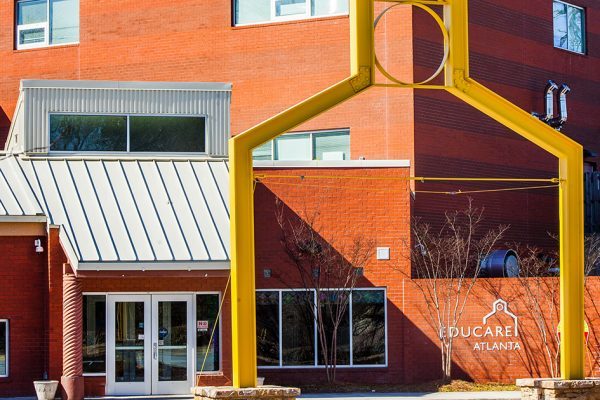The Sheltering Arms is a nonprofit organization providing early education and child care to working mixed-income families. We have 11 centers located in five counties in and around Atlanta, Georgia. The organization provides high-quality care for children from six weeks to five years old, as well as STEAM-focused summer enrichment program. Sheltering Arms offers Head Start, Early Head Start and Georgia Pre-K programs. Sheltering Arms centers serves up to 2,000 children daily.

In partnership with Atlanta Public Schools and the Annie E. Casey Foundation, Sheltering Arms’ Educare Atlanta Center is one of the nation’s most innovative school readiness programs.

As a Head Start grantee for over 25 years, Sheltering Arms offers a full-day, full-year schedule as well as blended classrooms that integrate children from diverse socio-economic backgrounds.
Sheltering Arms customizes The Creative Curriculum, a comprehensive early learning program to build children’s confidence, creativity and critical thinking skills. A living curriculum, taught by qualified teachers, is rooted in child development theory and based in the well-researched idea that play is essential to healthy growth.
38 research-based objectives make up the heart of the curriculum and guides the work of our teachers with the children in their classrooms. The objectives, predictors of school readiness, are aligned with the Georgia Early Learning and Development Standards (GELDS) and the Head Start Early Learning Outcomes Framework.
Our programs serve:

Rest Time
All children are given the opportunity to rest or nap between 12:00 and 2:00 every day based on their age. Cots and blankets are provided. Our infants nap on their own individual schedules.
Outdoor Play
Outdoor play is as important as indoor play. Our schedule allows for our children, ages 1-4 to spend at least 1 ½ hours per day outside, weather permitting. For our infants, we schedule at least 1 hour per day. We monitor recommendations based on the Clean Air Campaign’s color-coded air quality reports: We do not go outside on Code Red days, but may go out for a short time on Code Orange days.
Positive Guidance and Discipline
We believe a positive environment with clear, consistent expectations is the best way to teach our children how to live well in the world. We use active supervision, positive reinforcement, social skills instruction, and acting in a fair and honest way with all children — to define, teach and strengthen appropriate behavior and self-regulation.
Biting
Biting happens, especially among our toddlers, who are learning how to communicate effectively. Prevention is the key, but if your child is bitten or bites another child, our teachers will respond appropriately to both children and parents will be notified. Biting incidents are confidential.
Bathroom Training & Healthy Body Awareness
We use correct names for body parts and bodily functions with all our children and teach the difference between “good touch” and “bad touch” as appropriate, based on age.
Developmental Assessment
Children are regularly assessed by our teachers using the Teaching Strategies GOLD® ongoing observational assessment tool. It is aligned to state and national early learning educational standards and helps teachers identify and track the skill levels of each child throughout the year. We share a developmental assessment report two times per year with parents, and plan with parents so children can reach desired goals.
Join our mailing list to receive the latest news and updates from Sheltering Arms.